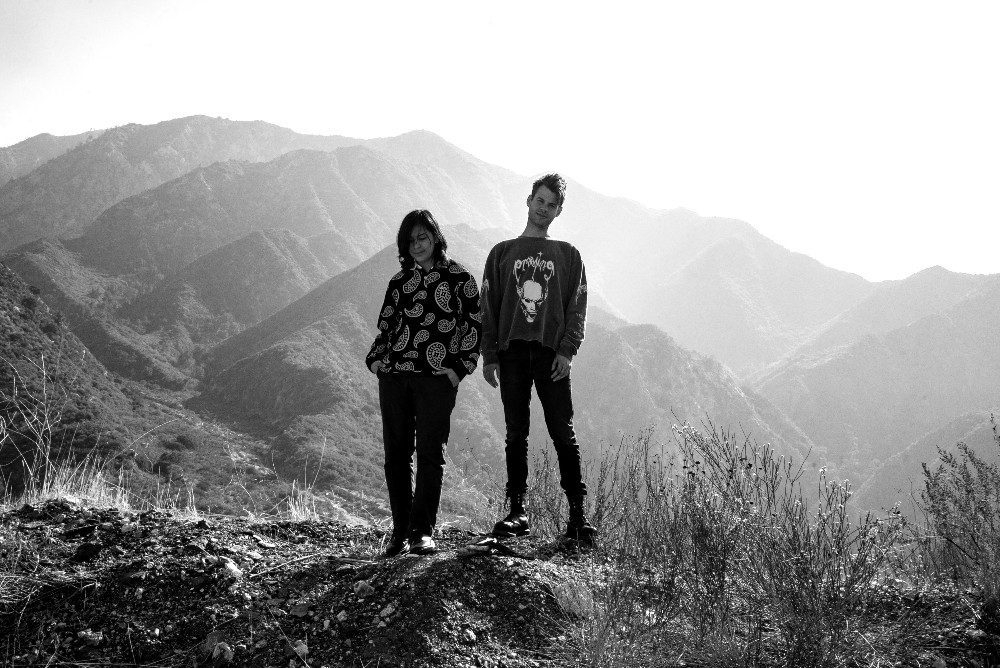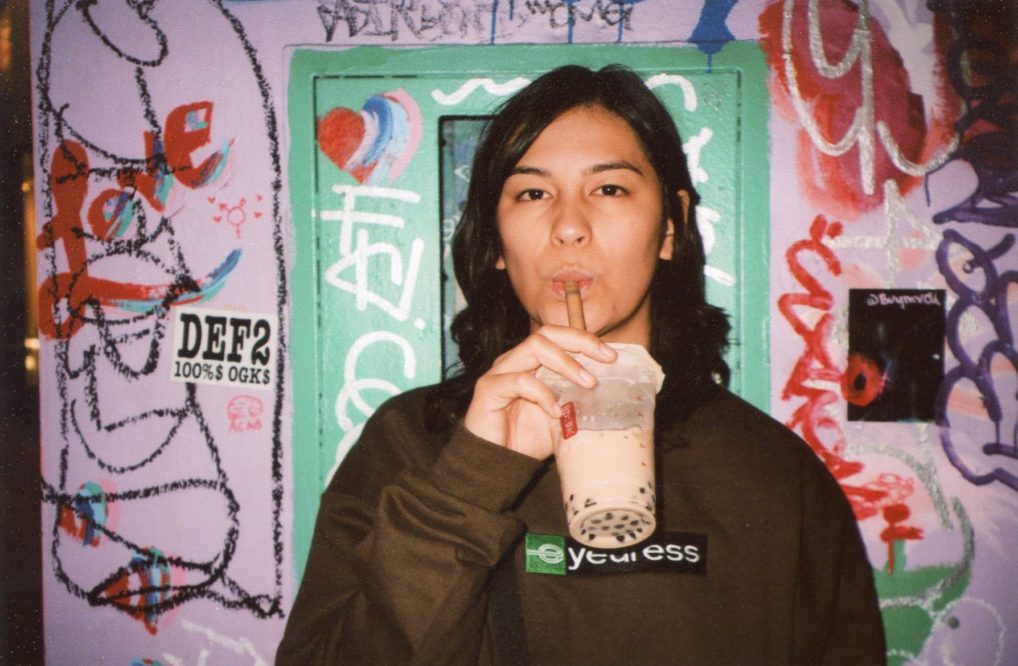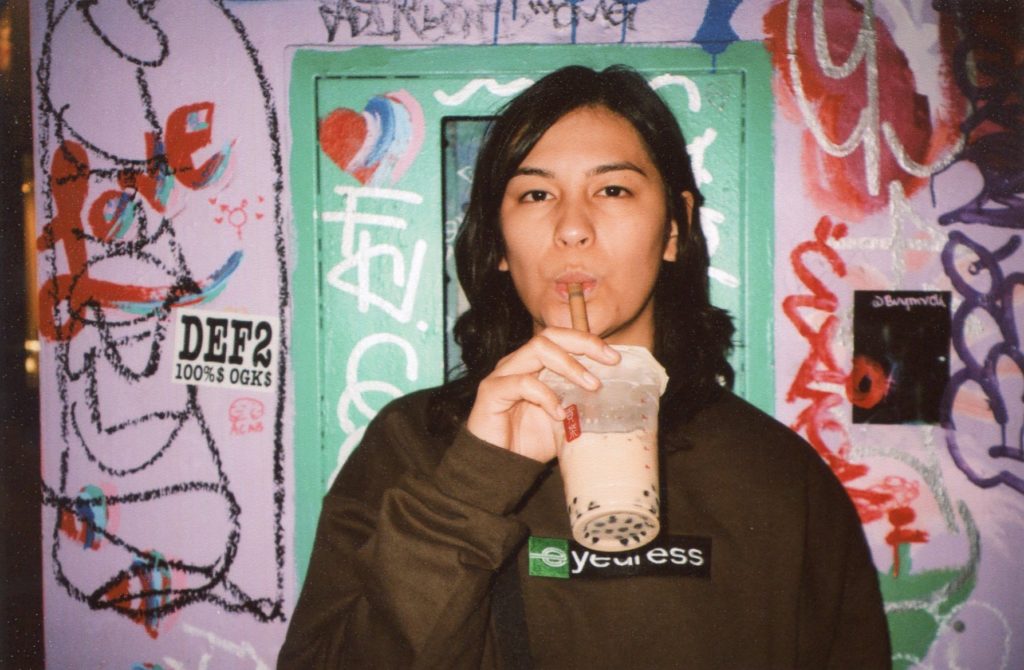Zzzahara and Ynes Mon Join Forces on Debut U.S. Velvet Video


Like mixing baking soda and vinegar in a science fair volcano, L.A.-based musicians Zahara Jaime and Collin Davis couldn’t help but react explosively once their powers combined.
Jaime has been hard at work on their solo project under the moniker Zzzahara, as well as playing guitar with Eyedress and in The Simps (both with Idris Vicuña). Davis makes expansive ambient soundscapes as Ynes Mon, releasing his debut LP Holyhead in March of this year. But once the pair started bonding over drum machines and post-punk, their combustible collaboration as U.S. Velvet began to take shape, and last week, they released a video for their eponymous single, directed by Brother Adam Willis.
Angular dance punk guitars, disenchanted attitudes, and a skronky sax solo from the mysterious Folerio soundtrack the world’s weirdest pool-party, populated mainly by cardboard cut-outs that stand in for a bygone era of idealized Hollywood glamour. “To me, the song is this hedonistic embrace of nihilism in present day America and the video reads almost like the opening scene from Blue Velvet… playing into the white picket aesthetic of the MAGA ‘American Dream’ while exposing true darkness that is hiding underneath,” explains Davis. “Then there’s Z and I, subverting and wreaking havoc upon it, like the slasher in a ’70s horror flick.”
“We live to erase/Take me to a far gone place,” the duo shout-sings, building up an arsenal of surrealist imagery along the way. Their nihilistic critique of modern-day struggle comes from observing it first-hand in rapidly gentrifying Highland Park. Jaime was born and raised there; Davis migrated from the Bay Area after dropping out of college to pursue music. “Z and I both worked service industry jobs on the same block. I had known Z very casually for a couple of years and we would just give each other free drinks at our wack jobs,” Davis remembers. “I think Z thought I was Billie Eilish’s brother for a long time because he was also a regular.”
“Collin was so friendly – every time he’d come up to me and be super smiley, and I’m just like, dude… why are you so happy all the time? Like, I’m fuckin’ miserable in my life, why are you so cool?” Jaime says with a laugh. Davis suggested they go to The OffBeat’s regular Monday night drag open mic, and though Jaime scoffed at the idea initially, they both eventually wound up there.
“Looking back I was pretty persistent on hanging out in the beginning but now they are one of my closest friends and collaborators so I’m glad I did,” says Davis. “I just always thought they had such a cool vibe from afar and then my good friend booked them at a show so I knew they were homie verified.”
By then, Davis had started working as a producer and sound engineer at Stones Throw Studios, a job he got through a mutual friend after working in a couple of different studios around L.A. “Working with all the artists who come through has been a huge blessing,” he says. “I’m always peeping game in studio sessions and learning from other artists’ process.”
It was a blessing for Jaime too, who had been recording at home for years, to finally have access to a studio setting – and their musical chemistry was on point. “Collin has taught me so much about audio stuff,” they say. “He can just read my mind and that’s why I love working with him so much. He’ll be like, ‘I feel like you need to tap into a more emotional riff…’ He brings out the better musician in me and I think I bring it out in him too because we feed off of each other. We could put together [ideas] and it becomes this poppy dark wave instrumental and it’s so sick.”
Still, Davis says, he and Jaime had no intentions of starting another band at first. “We went into Future Music on York Boulevard to browse and I pointed out a cool drum machine. The next day Z showed up at my door with the same drum machine in hand. Within 48 hours we had recorded two U.S. Velvet tracks,” he recalls. “Z and I have pretty different taste in music but we both love late ’70s and early ’80s post punk and goth so even though it was never discussed I think that became a natural jumping off point for our sound.”
Last year, they released debut single “Sleep Paralysis,” which sprawls gorgeously into the goth territory of songs like The Cure’s “Lullaby.” While “U.S. Velvet” is decidedly more boisterous, making use of cool audio tricks like a chopped up, backward vocal, both provide a nice entry point for the band’s sonic touchstones. The version of “U.S. Velvet” posted to Bandcamp is a full minute longer than the cut used for the video, thanks to a chaotically transcendent guitar solo bridge that somehow conveys just as must angst as the song’s despondent lyrics. And yet, the overall sound is nervy, infectious, and perfect for an apocalyptic dance party.
Regardless of the darker influences and motifs they’re drawn to, Jaime and Davis clearly approach U.S. Velvet from a place of wanting to have fun with it, and they develop songs for the project on a rolling basis, not worried about where they’ll go. In the meantime, Liminal Spaces, the debut album from Zzzahara, will be out on Lex Records sometime next year; Davis says he has been working on “a good amount of psych-R&B where I’m singing, and at least two instrumental albums made in collaboration with a therapist for psychedelic assisted therapy.” He will also release a song and video called “Sun Eyes” as Ynes Mon soon, with “a couple full projects done waiting in the wings for the right time.” When it comes to U.S. Velvet’s prescient dark-wave nihilism, it feels like there’s no better time than now.
Follow U.S. Velvet on Instagram for ongoing updates.



